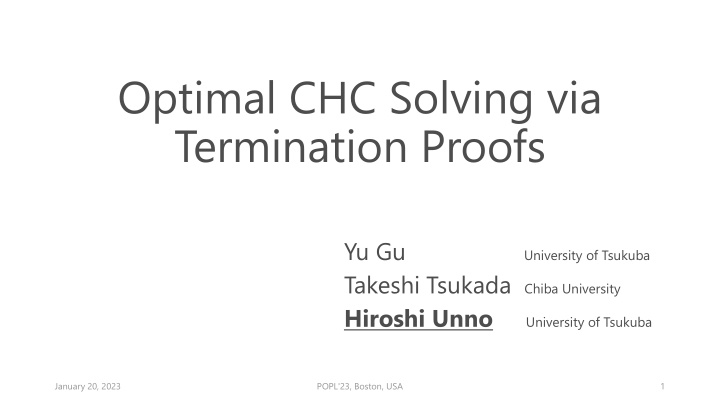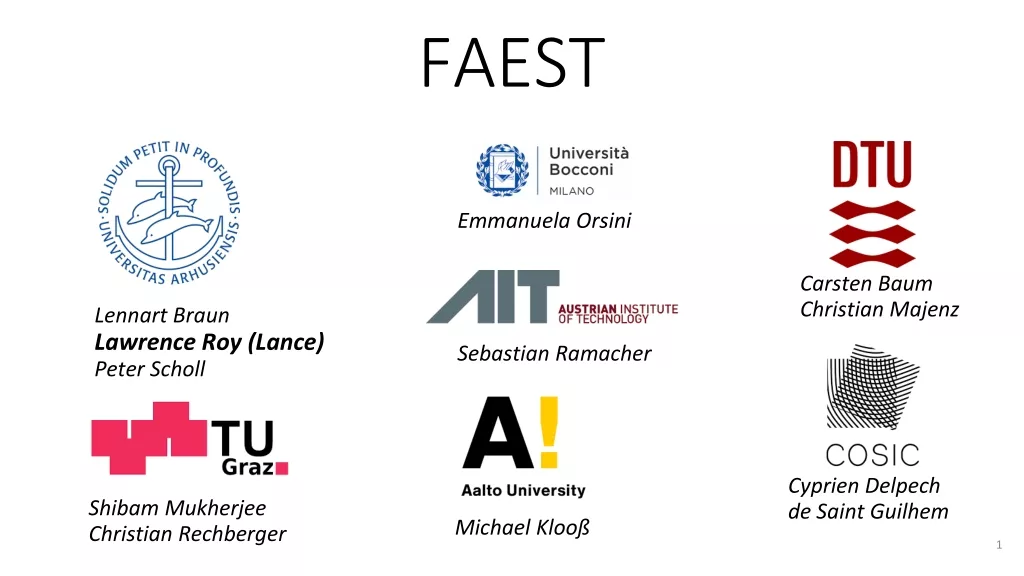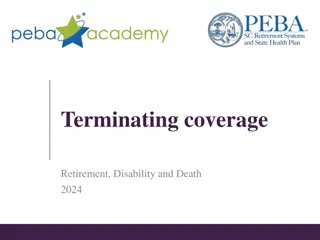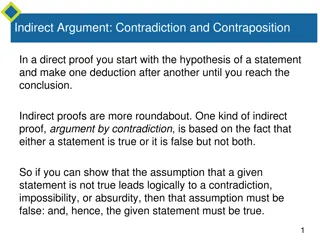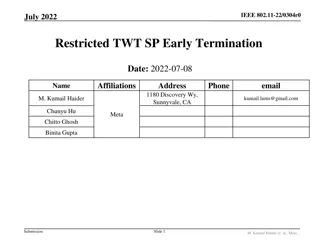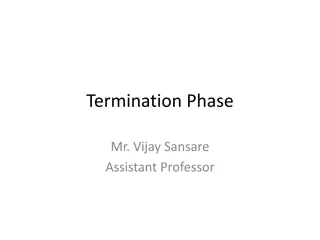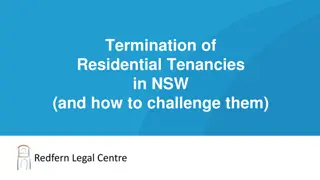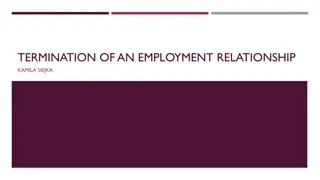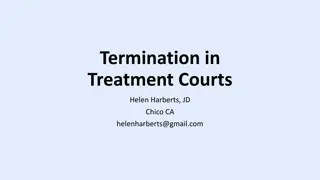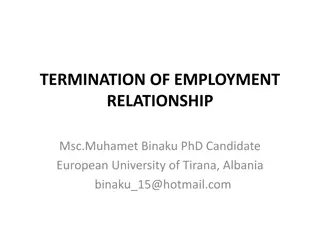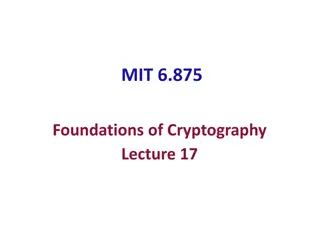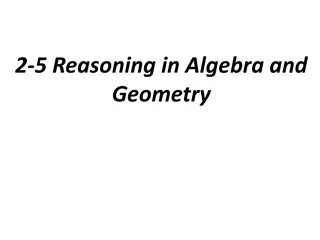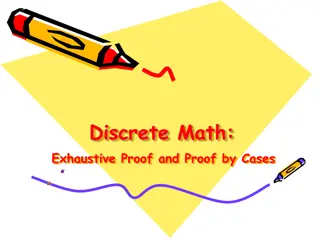Optimal CHC Solving via Termination Proofs
Verification of open programs and synthesis of maximal specifications are explored in this research, proposing an approach to find maximal specifications among sufficient ones. The process involves sufficiency checking as safety analysis using non-deterministic choices. Various examples and methodologies are discussed in detail.
Download Presentation

Please find below an Image/Link to download the presentation.
The content on the website is provided AS IS for your information and personal use only. It may not be sold, licensed, or shared on other websites without obtaining consent from the author.If you encounter any issues during the download, it is possible that the publisher has removed the file from their server.
You are allowed to download the files provided on this website for personal or commercial use, subject to the condition that they are used lawfully. All files are the property of their respective owners.
The content on the website is provided AS IS for your information and personal use only. It may not be sold, licensed, or shared on other websites without obtaining consent from the author.
E N D
Presentation Transcript
Optimal CHC Solving via Termination Proofs Yu Gu University of Tsukuba Takeshi Tsukada Hiroshi Unno Chiba University University of Tsukuba January 20, 2023 POPL'23, Boston, USA 1
Background: Verification of Open Programs Maximal specification synthesis [Albarghouthi+ 16, Prabhu+ 21, Zhou+ 21, ] Given an open program ? that invokes an unknown function ? Synthesize a maximally-weak specification of ? among those ensuring the safety of ? Example open program ?: s = 0; i = 0; while * do if * then s = s + ?(i); else i = i + 1; assert(s >= 0); Maximal specification of ?: ? ? int ? int | ? 0 ? 0 For any ?, if ? ? terminates by returning ?, then ? 0 ? 0 holds Refinement type optimization [Hashimoto & U. 15] Maximal specification synthesis for higher-order functional programs Maximize (resp. minimize) predicates in contravariant (resp. covariant) type positions January 20, 2023 POPL'23, Boston, USA 2
Our Approach to Maximal Specification Synthesis The goal is to find a maximal specification of ? among sufficient specifications A specification of ? ? ? is a predicate ? ? ? ( a postcondition of ?) ? is sufficient The program ? is assertion safe for any implementation of ? satisfying ? ? is maximal ?,? ?, ? ?,? is insufficient Example open program ?: s = 0; i = 0; while * do if * then s = s + ?(i); else i = i + 1; assert(s >= 0); Example specifications: ?1?,? is sufficient but non-maximal ?2?,? ? 0 is sufficient but non-maximal Check maximality via reduction ?????,? ? 0 ? 0 is maximal There may be multiple maximal & sufficient spec. in general to reachability analysis! Our method finds a maximal spec. by iteratively improving sufficient ones ?0,?1,?2 : If the current ??is maximal then return ??, and otherwise construct another sufficient ??+1that is strictly larger than ??and repeat until convergence January 20, 2023 POPL'23, Boston, USA 3
Sufficiency Checking as Safety Analysis Use an implementation of ? that is the worst among those satisfying ? as much as non-deterministic to simulate any implementation satisfying ? The sufficiency of ? is reduced to safety under demonic( ) non-deterministic choices of: Example open program ?: s = 0; i = 0; while * do if * then s = s + ?(i); else i = i + 1; assert(s >= 0); ? is sufficient ? is assertion safe for any implementation of ? satisfying ? def f_worst(x): y = nondet (); if ?(x,y) then return y else diverge s = 0; i = 0; while * do if * then s = s + f_worst(i); else i = i + 1; assert(s >= 0); January 20, 2023 ? is assertion safe for f_worst POPL'23, Boston, USA 4
Maximality Checking as Reachability Analysis ? is maximal ?,? ?, ? insufficient ?,? ?, ? is unsafe (i.e., an assertion violation is reachable) for the worst implementation f_worst of ? satisfying ? The maximality of ? is reduced to unsafety under demonic( ) & angelic( ) non-deterministic choices of: is ?,? def f_worst(a,b,x): y = nondet (); if ?(x,y) or (x,y)=(a,b) then return y else diverge a = nondet (); b = nondet (); assert(not ?(a,b)) s = 0; i = 0; while nondet () do if nondet () then s = s + f_worst(a,b,i); else i = i + 1; ?,? Example open program ?: s = 0; i = 0; while * do if * then s = s + ?(i); else i = i + 1; POPL'23, Boston, USA assert(s >= 0); January 20, 2023 assert(s >= 0); 5
Maximality Checking as Reachability Analysis ? is maximal ?,? ?, ? insufficient ?,? ?, ? is unsafe (i.e., an assertion violation is reachable) for the worst implementation f_worst of ? satisfying ? The maximality of ???? is reduced to unsafety under demonic( ) & angelic( ) non-deterministic choices of: ?????,? ? 0 ? 0 is ?,? def f_worst(a,b,x): y = nondet (); if ????(x,y) or (x,y)=(a,b) then return y else diverge a = nondet (); b = nondet (); assert(not ????(a,b)) s = 0; i = 0; while nondet () do if nondet () then s = s + f_worst(a,b,i); else i = i + 1; ?,? Example open program ?: s = 0; i = 0; while * do if * then s = s + ?(i); else i = i + 1; POPL'23, Boston, USA assert(s >= 0); January 20, 2023 assert(s >= 0); 6
Maximality Checking as Reachability Analysis ? is maximal ?,? ?, ? insufficient ?,? ?, ? is unsafe (i.e., an assertion violation is reachable) for the worst implementation f_worst of ? satisfying ? The maximality of ???? is reduced to unsafety under demonic( ) & angelic( ) non-deterministic choices of: ?????,? ? 0 ? 0 is ?,? def f_worst(a,b,x): y = nondet (); if x<0 or y>=0 or (x,y)=(a,b) then return y else diverge a = nondet (); b = nondet (); assert(a>=0 and b<0) s = 0; i = 0; while nondet () do if nondet () then s = s + f_worst(a,b,i); else i = i + 1; ?,? Example open program ?: s = 0; i = 0; while * do if * then s = s + ?(i); else i = i + 1; POPL'23, Boston, USA assert(s >= 0); January 20, 2023 assert(s >= 0); 7
Maximality Checking as Reachability Analysis The maximality of ???? is reduced to unsafety under demonic( ) & angelic( ) non-deterministic choices of: ?????,? ? 0 ? 0 Reachability to assertion violation is witnessed by Strategies for angelic non-deterministic choices: b, i<=a, and a=i and s>=0, respectively Lexicographic ranking function ? ?,? def f_worst(a,b,x): y = nondet (); if x<0 or y>=0 or (x,y)=(a,b) then return y else diverge a = nondet (); b = nondet (); assert(a>=0 and b<0) s = 0; i = 0; while nondet () do if nondet () then s = s + f_worst(a,b,i); else i = i + 1; assert(s >= 0); January 20, 2023 POPL'23, Boston, USA 8
Maximality Checking as Reachability Analysis The maximality of ???? is reduced to unsafety under demonic( ) & angelic( ) non-deterministic choices of: ?????,? ? 0 ? 0 Reachability to assertion violation is witnessed by Strategies for angelic non-deterministic choices: b, i<=a, and a=i and s>=0, respectively Lexicographic ranking function ? ?,? def f_worst(a,b,x): y = b; if x<0 or y>=0 or (x,y)=(a,b) then return y else diverge a = nondet (); b = nondet (); assert(a>=0 and b<0) s = 0; i = 0; while i<=a do if a=i and s>=0 then s = s + f_worst(a,b,i); else i = i + 1; assert(s >= 0); January 20, 2023 POPL'23, Boston, USA 9
Maximality Checking as Reachability Analysis The maximality of ???? is reduced to unsafety under demonic( ) & angelic( ) non-deterministic choices of: ?????,? ? 0 ? 0 Reachability to assertion violation is witnessed by Strategies for angelic non-deterministic choices: b, i<=a, and a=i and s>=0, respectively Lexicographic ranking function ? ?,? def f_worst(a,b,x): if x<0 or b>=0 or x=a then return b else diverge a = nondet (); b = nondet (); assert(a>=0 and b<0) s = 0; i = 0; while i<=a do if a=i and s>=0 then s = s + f_worst(a,b,i); else i = i + 1; assert(s >= 0); January 20, 2023 POPL'23, Boston, USA 10
Maximality Checking as Reachability Analysis The maximality of ???? is reduced to unsafety under demonic( ) & angelic( ) non-deterministic choices of: ?????,? ? 0 ? 0 Reachability to assertion violation is witnessed by Strategies for angelic non-deterministic choices: b, i<=a, and a=i and s>=0, respectively Lexicographic ranking function ? ?,? def f_worst(a,b,x): return b a = nondet (); b = nondet (); assert(a>=0 and b<0) s = 0; i = 0; while i<=a do if a=i and s>=0 then s = s + f_worst(a,b,i); else i = i + 1; assert(s >= 0); January 20, 2023 POPL'23, Boston, USA 11
Maximal Specification Synthesis as CHC Optimization Maximal specification synthesis problems can be reduced to problems of finding an optimal solution of Constrained Horn Clauses (CHCs), by using a standard translation from programs to CHCs and introducing a fresh predicate variable ? representing an unknown specification for the external function ? Reduced CHC optimization problem: Example open program ?: ???????? ? ?.?. s = 0; i = 0; while * do if * then s = s + ?(i); else i = i + 1; assert(s >= 0); ? 0,0 , ? ?,? ? ?,? ? ? + ?,? , ? ?,? ? ?,? + 1 , ? ?,? ? 0 January 20, 2023 POPL'23, Boston, USA 12
CHC Solving A CHC system ? is a finite set of constrained Horn Clauses of either form: or ?0?0 ?1?1 ???? ? ?1?1 ???? ? ?0,?1 ,??are predicate variables, ?0, ,??are sequences of terms of a first-order theory ?, ? is a formula of ? without predicate variables A predicate interpretation ? is called a (semantic) solution of ? iff ? ? Let ? be a set of predicate variables. We define an order ?1<??2on predicate interpretations by: ?1<??2 ? ?. ?1? ?2? January 20, 2023 POPL'23, Boston, USA 13
CHC Optimization [Hashimoto & U. 15] Let ? be a set of predicate variables and ? be a CHC system A CHC optimization problem is either: ???????? ? ?.?. ? asks to find a solution that is maximal w.r.t. <?among all solutions of ? ???????? ? ?.?. ? asks to find a solution that is minimal w.r.t. <?among all solutions of ? January 20, 2023 POPL'23, Boston, USA 14
CHC Optimization [Hashimoto & U. 15] (cont.) Subsume various predicate constraint optimization problems in the literature: CHC maximization [Prabhu+ 21] ???????? ? ?.?. ? Multi-abduction [Albarghouthi+ 16] Asks to find a maximal solution of ?1?1 ???? ? Coincides with the maximal specification inference problem for loop-free programs The maximality checking is reducible to quantified SMT solving Ranking function is needless because the termination of a loop-free program is trivial January 20, 2023 POPL'23, Boston, USA 15
Our Contributions 1. A computational theoretical analysis of the optimality checking problem for CHCs 2. OptPCSat: A CHC optimization method based on termination analysis 3. Implementation and evaluation of OptPCSat January 20, 2023 POPL'23, Boston, USA 16
Our Contributions 1. A computational theoretical analysis of the optimality checking problem for CHCs 2. OptPCSat: A CHC optimization method based on termination analysis 3. Implementation and evaluation of OptPCSat January 20, 2023 POPL'23, Boston, USA 17
Computational Theoretical Analysis of CHC Optimization and Multi-Abduction Theorem: Every satisfiable CHCs has a maximal solution Proved by Zorn s lemma (see the paper for details) Note: It is easy to see that every satisfiable CHCs has the unique minimum solution Theorem: The multi-abduction problem over LIA may not have a maximal solution in LIA The same result for LRA has already been shown by [Albarghouthi+ 16] Negative consequence: Our procedure OptPCSat that tries to construct LIA/LRA formulas representing a maximal/minimal solution is doomed to fail in such a pathological case Theorem: The CHC maximization problem over LIA is 2 Negative consequence: existing reduction to SMT solving [Prabhu+ 21] is unsound Positive consequence: techniques to solve any 2 We indeed apply termination analysis of programs, which is a typical ?? 0-complete 0-hard problem would be applicable ?-complete problem January 20, 2023 POPL'23, Boston, USA 18
Our Contributions 1. A computational theoretical analysis of the optimality checking problem for CHCs 2. OptPCSat: A CHC optimization method based on termination analysis 3. Implementation and evaluation of OptPCSat January 20, 2023 POPL'23, Boston, USA 19
OptPCSat Iteratively refine the current solution until an optimal one is found Check optimality and non-optimality of the current solution in parallel Reduce non-optimality to satisfiability of CHCs with non-emptiness constraints Reduce optimality to satisfiability of pfwCSP Current Solution ? Refine ? Non-Optimality Check Optimality Check Optimal Solution ? January 20, 2023 POPL'23, Boston, USA 20
OptPCSat Iteratively refine the current solution until an optimal one is found Check optimality and non-optimality of the current solution in parallel Reduce non-optimality to satisfiability of CHCs with non-emptiness constraints Reduce optimality to satisfiability of pfwCSP Current Solution ? Refine ? Non-Optimality Check Optimality Check Optimal Solution ? January 20, 2023 POPL'23, Boston, USA 21
Constraint-based Maximality Checking We further reduce the demonic- angelic reachability analysis to pfwCSP satisfiability, which is an extension of CHCs to (1) head-disjunction, (2) (synthesis of) total functions, and (3) well-foundedness constraints (Please see the paper for details) (1) and (2) are used for synthesizing strategies for nondet (3) is used for synthesizing the ranking function ? ?,? witnessing the reachability to assertion violation under nondet The maximality of ? is reduced to unsafety under demonic( ) & angelic( ) non-deterministic choices of: def f_worst(a,b,x): y = nondet (); if ?(x,y) or (x,y)=(a,b) then return y else diverge a = nondet (); b = nondet (); assert(not ?(a,b)) s = 0; i = 0; while nondet () do if nondet () then s = s + f_worst(a,b,i); else i = i + 1; assert(s >= 0); January 20, 2023 22
OptPCSat Iteratively refine the current solution until an optimal one is found Check optimality and non-optimality of the current solution in parallel Reduce non-optimality to satisfiability of CHCs with Non-Emptiness constraints Reduce optimality to satisfiability of pfwCSP Current Solution ? Refine ? Non-Optimality Check Optimality Check Optimal Solution ? January 20, 2023 POPL'23, Boston, USA 23
Constraint-based Non-Maximality Checking ?. ? ? ? ? ? CHCs+NE for Non-Maximality Checking of ? ? ? ? ? , NonEmpty ? ? ? Current Solution ? ? 0 , ? ? ? ? 1 ? = ? = ? ? ? < 0 Solve(? ? ) Solve(?) ? < 10 ? ? , NonEmpty(? 10 ? ? ) ? = ? = ? ? ? < 10 Current Sol. ? January 20, 2023 POPL'23, Boston, USA 24
Our Contributions 1. A computational theoretical analysis of the optimality checking problem for CHCs 2. OptPCSat: A CHC optimization method based on termination analysis 3. Implementation and evaluation of OptPCSat January 20, 2023 POPL'23, Boston, USA 25
Implementation and Evaluation Implemented OptPCSat in OCaml 5, using Z3 as a backend SMT solver Compared with HornSpec [Prabhu+ 21] that uses unsound SMT-based maximality checker, using CHC Maximization Benchmarks (Total 72) 1. 65 instances from [Prabhu+ 21] that encode maximal specification synthesis problems 2. 7 new instances manually designed to work as a counterexample for HornSpec OptPCSat found optimal solutions for non-trivial CHC optimization problems, despite the hardness HornSpec is generally faster as expected Among 57 solutions returned, OptPCSat has successfully shown that 47 solutions are optimal and 2 solutions are nonoptimal Practically useful to combine OptPCSat and HornSpec to complement each other! POPL'23, Boston, USA 26
Conclusion Computational theoretical analysis of CHC optimization and multi-abduction Theorem: The maximality checking problem of CHCs over LIA is 2 Maximality checking is as hard as termination analysis of programs An existing SMT-based maximality checking is unsound [Prabhu+ 21] OptPCSat: A new CHC optimization method based on termination analysis Iteratively refine the current solution until an optimal one is found Check optimality and non-optimality of the current solution in parallel Reduce non-optimality to satisfiability of CHCs with Non-Emptiness constraints Reduce optimality to satisfiability of pfwCSP Despite the computational hardness, our implementation of OptPCSat synthesized optimal specifications for non-trivial programs Future Work: Extension to pfwnCSP optimization to enable applications for Maximal specification synthesis ensuring non-safety (branching-time / liveness) specs. Semantic unrealizability checking for program synthesis January 20, 2023 POPL'23, Boston, USA 0-complete 27
